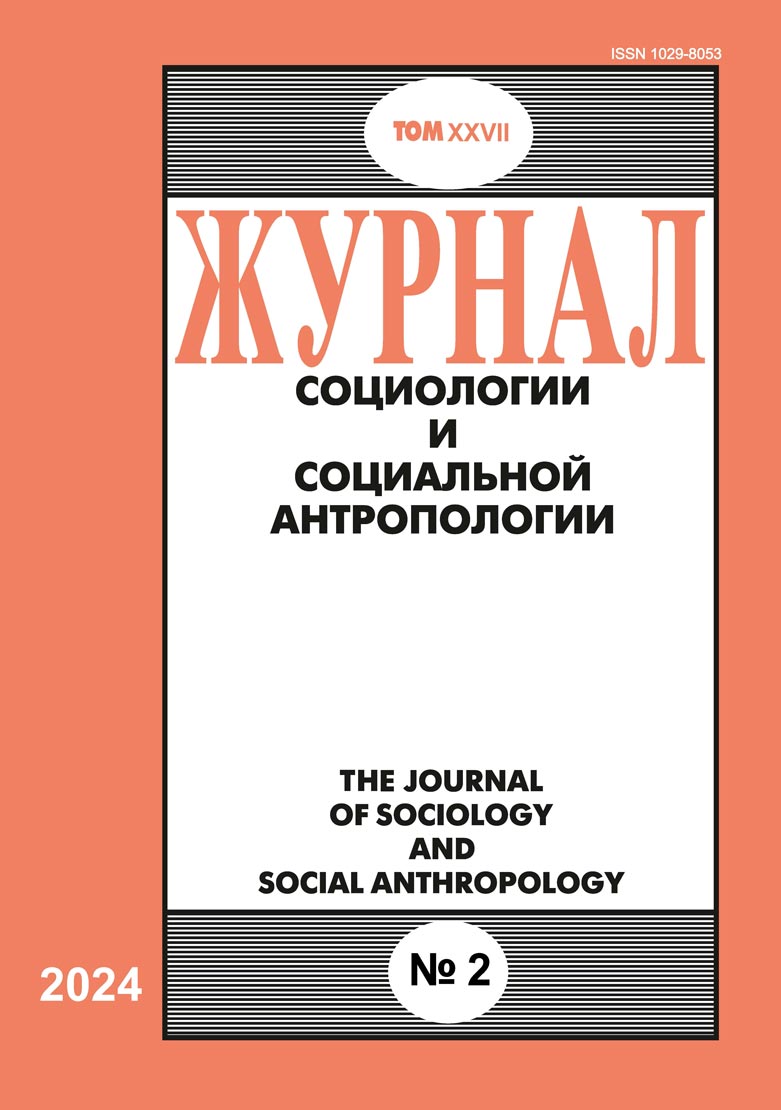Стратегии поддержания занятости и профессионализма российскими работниками
Научная статья
Аннотация
Литература
Гофман И. (2009) Ритуал взаимодействия. Очерки поведения лицом к лицу. Пер. с англ. С.С. Степанова и Л.В. Трубицыной. М.: Смысл.
Добрякова М. (2023) Ученик выигрывает: знания, грамотности и компетентности в школе. М.: ВШЭ.
Кастельс М. (2000) Информационная эпоха: экономика, общество и культура. Пер. с англ. под науч. ред. О.И. Шкаратана. М.: ГУ ВШЭ.
Кузьмина Ю.В., Попов Д.С. (2015) Функциональная грамотность взрослых и их включенность в общество в России. Социологические исследования, 7: 48–57.
Подольский О.А., Попов Д.С., Рылько Е.Д. (2015) Насколько компетентны сегодня взрослые россияне. Результаты Программы международной оценки компетенций взрослых (PIAAC) в Российской Федерации. М.: Нац. исслед. ун-т «Высшая школа экономики», Институт образования [http://piaac.ru/wp-content/uploads/2015/05/Report_PIAAC_RUS.pdf] (дата обращения: 11.11.2023).
Попов А.В., Соловьева Т.С. (2023) Особенности и перспективы развития сферы труда и занятости в Вологодской области. Социально-трудовые исследования, 53(4): 41–53. https://doi.org/10.34022/2658-3712-2023-53-4-41-53.
Реквиц А. (2022) Общество сингулярностей. О структурных изменениях эпохи модерна. Пер. с нем. Т.Ю. Адаменко, И.Г. Соколовской. DirectMESIA. [https://www.directmedia.ru/book-687570-obschestvo-singulyarnostey-o-strukturnyih-izmeneniyah/] (дата обращения: 15.11.2023).
Тощенко Ж.Т. (2022) Новое социально-экономическое явление: прекариат. Ноономика и ноообщество. Альманах трудов ИНИР им. С.Ю. Витте, 1(1): 146–161. https://doi.org/10.37930/2782-618X-2022-1-1-146-161.
Хабермас Ю. (2022) Теория коммуникативной деятельности. В 2 т. Пер. с нем. А.К. Судакова. М.: Весь мир.
Хокшильд А (2019) Управляемое сердце. Коммерциализация эмоций. М.: Издательский дом «Дело» РАНХиГС.
Adamchik V.A., Hyclak T.J., Sedlak P., Taylor L.W. (2019) Wage returns to English proficiency in Poland. Journal of Labor Research, 40: 276–295.
Azevedo A., Apfelthaler G., Hurst D. (2012) Competency development in business graduates: an industry-driven approach for examining the alignment of undergraduate business education with industry requirements. The International Journal of Management Education, 10(1): 12–28. https://doi.org/10.1016/j.ijme.2012.02.002.
Elsholz U., Neu A. (2019) Akademisierung der Arbeitswelt — Das Ende der Beruflichkeit? AISStudien, 12(1): 6–18. https://doi.org/10.21241/ssoar.64880.
Felstead A., Gallie D., Green F., Zhou Y. (2007) Skills at Work in Britain, 1986 to 2006. ESRC Centre on Skills, Knowledge and Organisational Performance [https://orca.cardiff.ac.uk/id/eprint/68042/1/Skills%20at%20Work,%201986%20to%202006.pdf] (дата обращения: 15.11.2023).
Fragoulis I. (2011) Social Skills for Successful Career Development. Review of European Studies, 3(1): 85–93. https://doi.org/10.5539/res.v3n1p85.
Frey C.B., Osborne M.A. (2013) The future of employment: How susceptible are jobs to computerisation? Oxford: Oxford University Martin Programme. [https://www.oxfordmartin.ox.ac.uk/downloads/academic/The_Future_of_Employment.pdf] (дата обращения: 10.11.2023).
Yang M.Y., You M., Chen F.C. (2005) Competences and Qualifications for Industrial Design Jobs: Implications for Design Practice, Education and Student Career Guidance. Design Studies, 26: 155–189. http://dx.doi.org/10.1016/j.destud.2004.09.003.
Hazlina A.N., Ramayah T., Wilson C., Kummerow L. (2010) Is entrepreneurial competency and business success relationship contingent upon business environment? A study of Malaysian SMEs. International Journal of Entrepreneurial Behavior & Research, 16(3): 182–203. https://doi.org/10.1108/13552551011042780.
Hecklau F., Galeitzke M., Flachs S., Kohl H. (2016) Holistic approach for human resource management in Industry 4.0. Procedia CIRP, 54: 1–6. https://doi.org/10.1016/j.procir.2016.05.102.
Husain M.Y., Mokhtar S.B., Ahmad A.A., Mustapha R. (2010) Importance of employability skills from employers’ perspective. Procedia. Social and Behavioral Sciences, 7(C): 430–438. https://doi.org/10.1016/j.sbspro.2010.10.059.
Meyer R., Haunschild A. (2017) Individuelle Kompetenzentwicklung und betriebliche Organisationsentwicklung im Kontext moderner Beruflichkeit — berufsp?dagogische und arbeitswissenschaftlche Befunde und Herausforderungen. bwp@. Berufs- und Wirtschaftsp?dagogik — online, 32: 1–20. [http://www.bwpat.de/ausgabe32/meyer_haunschild_bwpat32.pdf] (дата обращения: 15.11.2023).
Murnane R.J., Willett J.B., Duhaldeborde Y., Tyler J.H. (2000) How important are the cognitive skills of teenagers in predicting subsequent earnings? Journal of Policy Analytics and Management, 19(4): 547–568.
Noordegraaf M. (2015) Hybrid Professionalism and Beyond. Journal of Professions and Organization, 2(2): 198–206.
Noordegraaf M. (2020) Protective or Connective Professionalism? How Connected Professionals Can (Still) Act as Autonomous and Authoritative Experts. Journal of Professions and Organization, 7(2): 205–223.
Parsons T., Platt G. (1975) The American University. Cambridge, MA: Harvard University Press.
Rieckmann M. (2012) Future-oriented higher education: Which key competencies should be fostered through university teaching and learning. Futures, 44(2), 127–135. https://doi.org/10.1016/j.futures.2011.09.005.
Rosendahl A., Wahle M. (2016) Debatten zur Krise von Beruf und Beruflichket: A Never Ending Story? awp@. Berufs- und Wirtschaftsp?dagogik — online, 29: 1–23.
?krinjari? B. (2022) Competence-based approaches in organizational and individual context. Humanities and Social Sciences Communications, 9: 1–12. https://doi.org/10.1057/s41599-022-01047-1.
Verhaest D., Omey E. (2006) The impact of overeducation and its measurement. Social Indicators Research, 77(3): 419–448.
Ziegler B., Tenberg R. (Hrsg.) (2020) Berufsbildung 4.0. Steht die berufliche Bildung vor einem Umbruch? Bonn: Bundesinstitut f?r Berufsbildung.
Поступила: 03.11.2023
Опубликована: 09.06.2024






